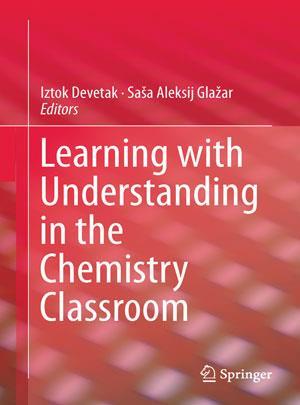A reincarnation of old foes
Learning with understanding in the chemistry classroom
Iztok Devetak and Saša Aleksij Glažar (eds)
Springer
2014 | 438pp | £90 (HB)
ISBN 9789400743656
http://amzn.to/1zbZYTz

I watched the 52 year-old children’s sci-fi TV series Doctor Who recently. I needed to catch up as ‘the Doctor’, a humanoid alien with good intent, is now in his twelfth reincarnation, ie new actor, who I had not seen in the part. The Doctor, a Time Lord, (always a man) whizzes through the universe in the Tardis (a blue police box), clutching a ‘sonic’ screwdriver, with an assistant (usually a girl) to conquer foes. This week the assistant, aided by said screwdriver, dispatched nasty two-dimensional zombies, thus saving the world. Doctor Who is fine if you have never seen it before. But zapped zombies are definitely not new if you have lived with it since the 1960s.
Similarly, twenty five years ago this book would have contributed to discussion of applications of constructivism and Alex Johnstone’s work on macro-micro-symbol representations. As it is, if you read what I said about Doctor Who, you will get the point. The book only adds new twists to discussions about topics that have been around a long time. Chapters revisit, for example, context based learning, strategies for probing understanding and using technology to enhance learning. Some are nicely done: Richard Coll and colleagues’ chapter on active chemistry learning in Thailand includes pleasing ideas for teaching stoichiometry, kinetics and dilution chemistry; and Torsten Witteck and colleagues’ ‘Learning Company’ approach uses contexts to develop positive learning cultures among German lower secondary students. I also enjoyed Treagust, Mthembu and Chandrasegaran’s chapter on using predict-observe-explain to enhance students’ understanding of redox reactions. The new strategies presented can be easily lifted from book to classroom.
However, a lack of rigorous editing means other chapters are, at best, impenetrable, and/or include obvious statements such as ‘student learning is a complex process’, ‘the sub-microscopic level cannot easily be seen directly’, ‘computer lab simulations are available on the internet’ and, most tellingly and frequently, ‘similar results have been found by other researchers’. Current issues such as learning progressions, threshold concepts, green chemistry, argumentation and pedagogical content knowledge are ignored. This is an opportunity lost, best zapped with a sonic screwdriver.
Purchase Learning with understanding in the chemistry classroom from Amazon.co.uk









No comments yet